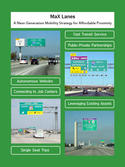The California High-Speed Rail Authority promises to “achieve net zero greenhouse gas (GHG) emissions in construction” and is committed to operate the system on “100% renewable energy” by contracting for “400 to 600 megawatts of renewable power”. These promises may please environmentalists, but they cannot be kept. read more »
Transportation
California’s Global Warming High-Speed Train
- Login to post comments
Dispersed Cities: Starting the 3rd Decade
Cities (urban areas or settlements) have been around for millennia. Over that time, cities have changed in form and function. But the way that people move around the city has materially changed only twice. Walking was predominant until less than 200 years ago, then came mass transit, the automobile and now autonomous cars and some substitution for driving by online technology. read more »
- Login to post comments
Is Your Transportation Project a Boondoggle?
Tony Dutzik, writing for the progressive Frontier Group, offers a ten ways of recognizing whether a highway project is a boondoggle. A few of his ideas are valid: a highway widening project aimed simply at creating a continuous four-lane road even when there is no demand for four lanes seems silly. read more »
Amtrak and Express Coach Lines: What's Competition Have To Do With It?
Express coach lines like BoltBus and Megabus have grown dramatically in recent years, providing millions of Americans with new mobility options. When the subject of competition between bus and train arises, however, many transportation wonks instantly become minimizers. Some cite growing rail traffic to make the case that this competition hardly matters. Others point to severe congestion on the Northeast Corridor (NEC)—Amtrak’s busiest route—to build the argument that attempting to lure passengers from buses to trains is a pointless exercise. read more »
- Login to post comments
Rebuilding America's Infrastructure
President Trump promised a $1 trillion infrastructure plan during his campaign. Spending more money on infrastructure is something that has broad support among people of all political persuasions.
But as the case of Louisville’s $2.4 billion bridge debacle shows, not all infrastructure spending is good spending. read more »
- Login to post comments
Rail in Legacy Cities vs. Federal Funds to Poorer Markets
Someone asked me to reconcile my recent paper on rail funding with my stance on Cal-Train electrification that the feds should prioritize funding towards poorer cities. Very good question because there is an apparent conflict there. read more »
- Login to post comments
Cincinnati Streetcars’ “Catastrophic Failures”
The Cincinnati streetcar–now known as the Cincinnati Bell Connector since Cincinnati Bell paid $3.4 million for naming rights–is barely six months old, and already is having problems. Four streetcars broke down in one day a few months ago. read more »
MaX Lanes: A Next Generation Strategy for Affordable Proximity
This is the introduction to a new report written by Tory Gattis of the Center for Opportunity Urbanism. Download the full report here.
The core urban challenge of our time is ‘affordable proximity’: how can ever larger numbers of people live and interact economically with each other while keeping the cost of living – especially housing – affordable? In decentralized, post-WW2 Sunbelt cities built around the car, commuter rail solutions don’t work and an alternative is needed, especially as we see autonomous vehicles on the horizon. read more »
- Login to post comments
Subsidies Haven't Increased Transit Ridership
In 2015, the American Public Transportation Association issued a press release whose headline claimed that transit ridership in 2014 achieved a new record. However, the story revealed that 2014 ridership was the highest since 1956. That’s no more a record than if it was the highest since 2013. read more »
- Login to post comments
Reason #1 to End Transit Subsidies: It’s the Most Costly Transportation We Have
Fifty-three years ago, the transit industry was mostly private and earned a net profit. Today, it’s almost entirely publicly owned, and subsidies have grown out of control. It’s time to take a stand and say all transportation subsidies are bad, but transit subsidies are the worst. read more »
- Login to post comments



















